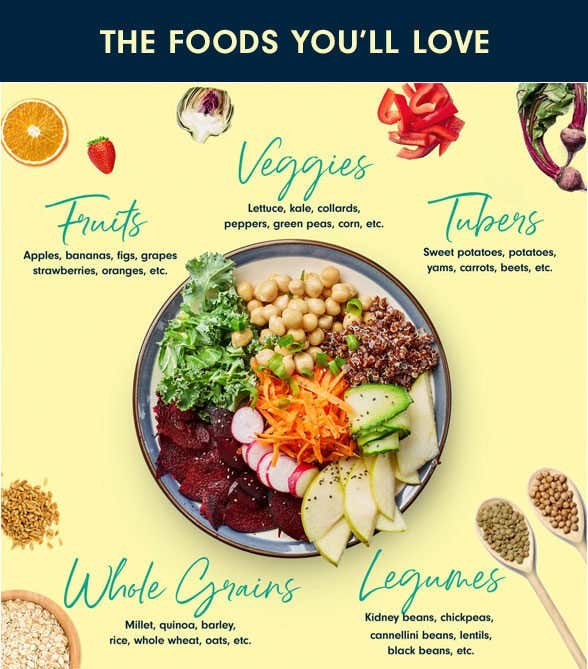Are Sugar Free Sauces Actually Healthy? A Breakdown for Plant-Based Eaters
Are Sugar Free Sauces Actually Healthy? A Breakdown for Plant-Based Eaters
Blog Article
Everything About Healthy Food: Benefits of Embracing Plant Based Alternatives
The conversation bordering plant-based diets has acquired considerable interest in recent times. Many people are discovering the prospective wellness benefits, dietary advantages, and environmental influences connected with these dietary choices. As individuals come to be more familiar with their food's impact on wellness and sustainability, questions emerge about the functionalities of adopting such a way of life. What certain adjustments can one anticipate, and how might these choices reshape not just individual health however also the earth's future?
Comprehending Plant-Based Diet Plans
Although many individuals link plant-based diet plans mostly with vegetarianism or veganism, these diets can incorporate a variety of consuming patterns that focus on whole, minimally refined plant foods. Such diets commonly consist of fruits, vegetables, entire grains, nuts, seeds, and legumes, while removing or restricting pet items. This versatility permits people to customize their dietary selections according to personal preferences and dietary requirements. Some may embrace a primarily plant-based diet regimen while still occasionally consuming meat or dairy products, typically described as a flexitarian method. The emphasis stays on including more plant foods, which can bring about a diverse variety of flavors and meals. Understanding these numerous interpretations of plant-based eating is necessary for valuing its ease of access and allure in modern food society.
Health And Wellness Advantages of Plant-Based Foods
The health benefits of plant-based foods are considerable, offering a nutrient density benefit that supports general health. Research study suggests that these foods can enhance heart health and wellness and play a vital function in effective weight management. By incorporating much more plant-based options, individuals might improve their dietary selections and advertise lasting health.
Nutrient Density Benefit
Nutrient thickness plays an essential duty in the health and wellness advantages of plant-based foods, making them an engaging choice for those seeking a well balanced diet. Plant-based foods, such as fruits, veggies, beans, nuts, and whole grains, are typically rich in vital vitamins, minerals, and anti-oxidants while being reduced in calories. This high nutrient density allows people to consume fewer calories while still fulfilling their dietary needs. Furthermore, these foods are packed with dietary fiber, advertising digestive health and assisting in weight administration. By including nutrient-dense plant-based alternatives, consumers can improve their total health and wellness, support their immune systems, and lower the risk of persistent diseases. Ultimately, the nutrient thickness of plant-based foods emphasizes their value in a health-conscious lifestyle.
Heart Wellness Improvement

Weight Management Support
Along with advertising heart health, a plant-based diet regimen can significantly aid in weight monitoring. This dietary strategy stresses whole foods such as fruits, veggies, vegetables, nuts, and entire grains, which are typically lower in calories and higher in fiber contrasted to animal-based items. The high fiber web content assists boost satiation, decreasing general calorie consumption. Plant-based diet plans are commonly abundant in crucial nutrients while low in undesirable fats, making it simpler to maintain a healthy weight. Research study shows that individuals who take on a plant-based way of living tend to have reduced body mass indexes (BMIs) and experience even more successful weight-loss contrasted to those who eat meat-heavy diets. Subsequently, accepting plant-based options is a calculated selection for effective weight administration
Nutritional Worth of Plant-Based Active Ingredients
Plant-based ingredients are abundant in necessary nutrients, offering a diverse array of vitamins, minerals, and antioxidants that contribute to total health and wellness. A contrast of healthy protein sources reveals that while animal items are often considered as premium, several plant-based options give sufficient healthy protein and various other helpful substances. Recognizing the dietary value of these components can help individuals make notified nutritional selections.
Important Nutrients in Plants
Nutrient-rich active ingredients found in plants supply a varied array of vital vitamins and minerals that add greatly to overall health. These active ingredients are rich in vitamins A, C, and K, which support immune feature, vision, and blood clotting, specifically. On top of that, plants give vital minerals such as calcium, potassium, and magnesium, crucial for heart health, muscle mass function, and bone strength. The existence of fiber in plant-based foods aids digestion and advertises a healthy digestive tract microbiome. Anti-oxidants, found abundantly in veggies and fruits, aid fight oxidative stress and anxiety and reduce inflammation. Furthermore, many plant foods are low in calories yet high in nutrients, making them a superb choice for those looking for to keep a healthy weight while ensuring excellent nutrient consumption.
Comparing Protein Sources
Protein sources vary significantly in their nutritional accounts, with plant-based ingredients using special advantages. Unlike animal healthy proteins, which usually contain saturated fats and cholesterol, plant proteins often tend to be reduced in these undesirable parts. Legumes, nuts, seeds, and entire grains are rich in essential amino acids, fiber, vitamins, and minerals. Lentils provide high protein material alongside substantial iron and folate, while quinoa is a total protein, offering all 9 necessary amino acids. Furthermore, plant-based proteins are typically gone along with by anti-oxidants and phytochemicals that sustain general health and wellness. The shift to plant-based protein resources not only boosts nutritional intake but likewise aligns with lasting nutritional practices, reducing environmental influence and promoting long-term health and wellness benefits.
Ecological Influence of Plant-Based Consuming
As understanding of climate adjustment expands, several individuals are exploring sustainable dietary options that can greatly reduce their environmental footprint. Plant-based eating has become a significant contributor to lowering greenhouse gas emissions, which are mostly related to livestock production. The farming of fruits, vegetables, grains, and veggies normally needs fewer sources, such as water and land, compared to animal farming. Additionally, plant-based diet regimens can lead to decreased logging, as less land is required for grazing livestock or growing pet feed. By changing towards plant-based options, customers can support biodiversity and promote much healthier environments. In general, embracing plant-based eating not just benefits individual health and wellness however also stands for an essential step towards ecological sustainability and preservation efforts.
Overcoming Common Misconceptions
While lots of people recognize the advantages of a plant-based diet plan, a number of misunderstandings often hinder them from totally accepting this a knockout post way of life. An usual idea is that plant-based diets do not have adequate healthy protein; however, numerous plant resources, such as beans, nuts, and tofu, give adequate protein. Additionally, some presume that this diet plan is expensive, when in fact, staples like beans, rice, and seasonal veggies can be quite economical. One more misconception is that plant-based consuming is excessively limiting, whereas it really offers a varied selection of flavors and foods. Lastly, numerous fret that a plant-based diet might bring about deficiencies, yet with proper planning, individuals can obtain all necessary nutrients, including minerals and vitamins, while enjoying a variety of scrumptious dishes.
Tips for Transitioning to a Plant-Based Lifestyle
Making the shift to a plant-based lifestyle can be an enhancing experience, though it commonly requires some advice to browse the initial adjustments. Individuals are motivated to begin gradually, integrating even more fruits, veggies, beans, and entire grains into their dishes while minimizing meat and dairy products intake. Meal planning is important; preparing a weekly menu can help ease the modification and avoid final unhealthy options. Checking out cooking methods and brand-new recipes can likewise maintain and boost the experience exhilaration regarding plant-based consuming. Furthermore, joining support system or neighborhoods can give inspiration and share important pointers. Ultimately, remaining educated concerning nutrition warranties well balanced dishes, preventing deficiencies while fostering a healthy and balanced, rewarding plant-based way of living.
Delicious Plant-Based Dish Concepts
Discovering delicious plant-based meal ideas can influence individuals to accept an extra nutritious diet regimen. One prominent choice is a passionate quinoa salad, featuring cherry tomatoes, cucumber, and a spicy lemon-tahini dressing. An additional fave is a full-flavored lentil stew, loaded with carrots, celery, and aromatic natural herbs, best for a calming dinner. For morning meal, overnight oats made with almond milk, chia seeds, and covered with fresh berries offer a nourishing start to the day. Additionally, a lively vegetable stir-fry with tofu and a selection of vivid veggies can be a fast yet pleasing meal. Velvety avocado toast on whole-grain bread, sprinkled with seeds and spices, offers a basic yet savory treat. These dishes display the selection and splendor of plant-based consuming.

Regularly Asked Concerns
Can a Plant-Based Diet Plan Provide Enough Protein?
The question of whether check over here a plant-based diet can give sufficient protein prevails. Various resources, consisting of legumes, nuts, seeds, and whole grains, can satisfy protein requires successfully, supporting a well balanced and nourishing diet regimen for people.
Are Plant-Based Diets Suitable for Kid?
The suitability of plant-based diet regimens for youngsters depends on mindful preparation. Adequate nutrients should be ensured, consisting of vitamins, minerals, and proteins. With proper advice, such diets can support healthy growth and growth in kids.
How Do I Eat Out on a Plant-Based Diet plan?
Eating in restaurants on a plant-based diet plan includes looking for dining establishments with diverse food selections, asking for alterations, and exploring vegan-friendly choices. Preparation ahead and communicating dietary choices can enhance the dining experience while preserving dietary choices.
What Prevail Irritants in Plant-Based Foods?
Usual allergens in plant-based foods consist of soy, gluten, nuts, and seeds - Sugar Free Sauces. Individuals adhering to a plant-based diet plan ought to know these allergens and read tags carefully to avoid unfavorable responses and assure risk-free intake
Can Plant-Based Diets Aid With Weight Loss?
Research indicates that adopting a plant-based diet regimen might help with weight reduction due to its commonly lower calorie density and higher fiber web content. This mix can boost satiation, assisting individuals handle their calorie intake properly. Lots of people connect plant-based diets mainly with vegetarianism or veganism, these diets can include a wide array of eating patterns that prioritize entire, minimally processed plant foods. Nutrient density plays a necessary function in the health advantages of plant-based foods, making them an engaging selection for those looking for hop over to these guys a well balanced diet regimen. Plant-based diet plans have actually been revealed to markedly enhance heart health and wellness, as they typically contain components that support cardiovascular feature. In enhancement to promoting heart wellness, a plant-based diet can considerably aid in weight management. A common idea is that plant-based diets lack adequate protein; nonetheless, various plant sources, such as legumes, nuts, and tofu, offer adequate healthy protein.
Report this page